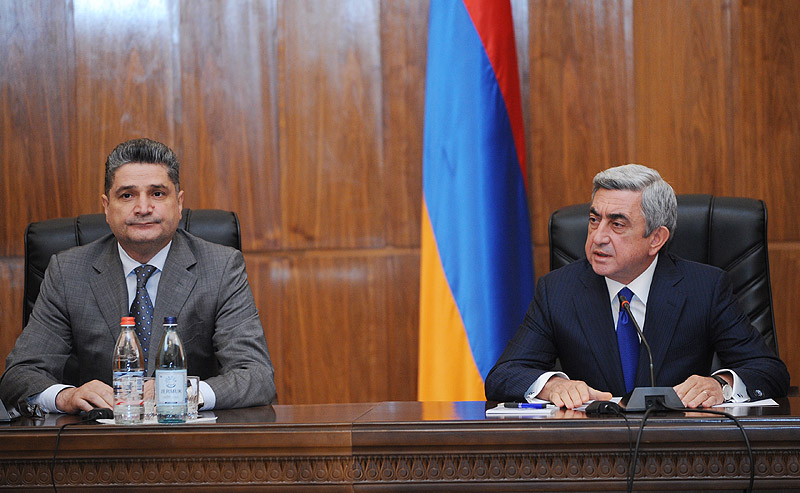Armenian President Serzh Sargsyan called a meeting of the Armenian government on Saturday, Sept. 15, to discuss two important issues.
“The meeting in this format was initiated by me,” he began his address to Prime Minister Tigran Sargsyan and his Cabinet members. “And I intend to conduct such meetings regularly. Our problems, and internal and external challenges we face, demand a more coordinated effort,” he said, which could be interpreted as meaning he is not satisfied with the government’s efforts to coordinate. The Armenian president’s words could also be read as indicating a sort of emergency rule and mobilization of forces.
Underlining his desire to take an “active part” in “pan-national,” which could be read as “pan-Armenian,” efforts, he declared the two main challenges to be the “Safarov case” and the “developments in Syria.”
Read also
To remind my readers: The Safarov case regards an Azeri army officer, Ramil Safarov, who murdered an Armenian army officer, Gurgen Markaryan, during an English-languageNATO course in Hungary in 2004. A Hungarian court decided this year to extradite Safarov to Azerbaijan, on the condition that he would serve his life imprisonment there.
But Safarov was immediately released, promoted and given a free flat to live in by the Azeri government when he arrived in Baku. The Hungarian government, which had previously received nearly 3 billion Euros in loans from oil- and gas-rich Azerbaijan, rejected claims that there had been a secret agreement on this. Nevertheless, Armenia cut all diplomatic ties with EU-member Hungary immediately, on Aug. 31. Now Sargsyan says “Azerbaijan has crossed the limits,” and is asking his government to launch an international campaign about the issue, which is likely to further increase the tension in the Caucasus. The Safarov case could have a negative impact on the issue of Nagorno-Karabakh and other Azeri territories under Armenian occupation since 1993, which was the reason why Turkey closed its border with Armenia.
Azerbaijan, which is involved in large-scale projects with the EU and Turkey, with U.S. support, to decrease Europe’s dependence on Russian and Gulf oil and gas, might have an upper hand regarding realpolitik balances right now. Azeri President İlham Aliyev walks with such self-confidence. But taken together with Sargsyan’s remarks on Syria, this may lead to something different in the bigger picture.
Despite a call from the Middle Eastern churches to all Christians in civil-war torn Syria not to leave their homeland of thousands of years, Sargsyan says Armenia should give a hearty welcome to those who want to migrate. “The situation in the Middle East and Arab states is directly interconnected with the security of our country,” Sargsyan said, asking his government not to raise bureaucratic obstacles to Armenian immigration from Syria, and to make life easier for them.
Besides its humanitarian dimension, this move might have smart political and economic motivations as well. Armenia is a landlocked country with scarce resources. Rich Armenians tend to live in countries like the U.S., France and Canada. Armenia’s population is in decline, and its dependence on financial support from its diaspora limits the degree of political freedom the Armenian government has.
It may not exactly look like the Jewish exodus to Israel following its establishment in 1948, but well-off Armenians from Syria could bring a new impetus to Armenia’s economic and social life, and its political life, too. “Situations change rapidly,” Sargsyan said, asking his government to try to “respond as speedily as possible”.























































